- Home
- Saul Tanpepper
Shelter in Place: A short story from the world of BUNKER 12 Page 3
Shelter in Place: A short story from the world of BUNKER 12 Read online
Page 3
"It's … dead," Allison lied. She still had thirty percent, but there were no bars. She normally had at least four here at the school, thanks to a nearby tower. But she didn't want to have to tell Rosa no. There was no sense in wasting what little battery she had left on frivolous attempts to call out when there was no signal.
"I'm scared, Allison."
"Me, too. But we're safe here."
"I hope so."
Neither of them spoke for a long time after that. Allison remained seated beneath the vent and took solace in knowing that her colleague was there too, just on the other side of the wall.
She may have dozed off, she wasn't sure. It was impossible to tell if her eyes were open or not or to tell the difference between being awake and asleep. Her gaze drifted over to the door, where she expected to see light from the lamps outside spilling in underneath. But there was none. The room was pitch black. Not even the tiny diodes from the television or the digital projector were lit. The clock above her head had also stopped ticking.
She slid herself up the wall and listened to the vent. The air was completely still, as if the school were holding its breath.
"I think the generator's out of gas, Rosa. There's no power."
There was no reply.
"Rosa?"
She thought she heard the same soft scratching sound she'd heard earlier, like something was rubbing against the wall on the other side.
"Rosa," she called again, a little louder, "are you there?"
In the corner on the sharing mat, the children stirred but did not wake. Allison found a chair and slid it underneath the vent, then carefully mounted it and pressed her ear against the cold metal. Sounds of movement became more distinct.
"Rosa? Anyone?"
The sounds stopped for a moment before resuming with greater urgency.
"Is everything okay over there?"
The next noise she heard chilled her to the bone. It sounded a little like snakes. Allison reeled back and nearly fell off the chair.
She wished she knew what was happening in Rosa's room. In all the rooms. Out there. She prayed everyone was okay.
It's not. Something happened. Something's wrong.
Using the light from her phone to guide her, she made her way over to the window. The pathway lamps were extinguished, the darkness outside as deep as it was inside. A few stars shone through the tattered clouds high above, distant pinpricks of white too faint to illuminate anything. There was no moon.
Scanning the quad, she could not find a single trace of light from any of the other classrooms. Someone could be out there and she wouldn't even know it.
* * *
Allison woke in the hour before dawn and slipped off toward the bathroom, once more using her phone for light. The battery was down to seventeen percent, and she silently cursed herself for not shutting it off earlier to conserve it.
The phone chirruped as she stepped to the door, notifying her of a slew of new text messages and calls. The signal strength kept wavering between one bar and zero, and her attempts to retrieve her voice mail messages were unsuccessful. Even worse, her battery strength plummeted to fourteen percent. She stepped over to the window hoping the signal would improve. It didn't.
The text messages were no different than the ones she'd seen the day before—pleas to keep the children safe and to not go outside, promises from parents that they’d do whatever it took to get to the school. Peter Cundiff, Rodney's father, was on his way with his wife.
She noted that his message had been sent less than twenty minutes before.
At least there's that. If the roads are clear, maybe the situation has improved.
She tried James's phone, but was rewarded with nothing but dead silence. And now her battery was down to eleven percent.
On a whim, she tapped on her news app and fretted while the hourglass kept spinning on the screen. The battery ticked down to ten. Then nine. Just as she was about to cancel, the page finally loaded. The top story was seven hours old. The headline read:
MYSTERIOUS INFECTION SPREADS ACROSS GLOBE
REUTERS | World | 10:08pm EST
Staff writer Steve Armady contributed to this article
GENEVA, Switzerland (Reuters) - The World Health Organization has confirmed that a devastating human contagion of unknown origin and makeup has swept across the world, infecting people in every nation on every continent.
The disease, a suspected neural pathogen, appears to target certain brain functions affecting motor control and self-restraint. It first appeared in the Washington DC Metro area at 10:47am EST, Wednesday, following several police reports of unusual assaults. Similar reports in all major cities across the globe hit news and social media sites within minutes.
Most infected individuals appear non-aggressive. However, violence has been observed in isolated cases and may be due to rapid degeneration of neurological processes. Transmission is highly efficient, requiring little more than skin-to-skin contact. Little else is known about the disease, which media have taken to calling the Flense, a reference to the horrific attacks perpetrated by some afflicted individuals. No explanation for its sudden and universal appearance has been offered.
Individuals are advised to remain indoors until further notice. Do not approach strangers. Avoid close contact with anyone suspected of being infected. Please stay off the streets so that health and safety professionals are able to perform their duties.
Her eye caught the trending topics on the page before her phone chirped out a critical low-battery warning. The top subject was #globalinfection, followed by:
#bioterrorism
#internetcrash
#callmecaitlin
#theflense
#nopower
After trying one last time to call James, she shut the phone off and removed the battery, believing it would help preserve that last five percent. Then she slipped both pieces into separate pockets of her slacks.
The darkness pressed against her, an unbridgeable gulf separating her from the rest of the world—her other students, her fiancé, her life. She felt as small as a mote, a speck of dust, an atom floating in space, flung into the vacuum by happenstance and buffeted by invisible forces far greater than the ones she could control. She wrapped her arms about her chest, as if she feared her body might suddenly disintegrate.
How could this be happening? How could it all go so bad so quickly?
A soft, slow tapping sound reached her ears. Thinking it was Rosa again, she made her way over to the vent. It took her several seconds to locate its true source, several more to work up the courage to pull the blind away from the window and peek outside.
A dark mass was huddled beneath the adjacent window; the shape was barely discernible, a darker shade than the black of night, and she realized with alarm that it was a person. Yet with it came the realization that she could see, if only the tiniest bit. The first light of morning had begun to bleach the ink from the sky. Relief flooded through her.
The figure appeared to be crouching in a loose ball. Pressed up against the wall, it was impossible to say whether it was a man or a woman. A hand reached up, pale and bony in the wan light; the fingers pried at the bottom sill. The tapping was the click of nails on the window pane.
What are they doing? Who is it? Why are they out there?
And on the heels of those questions:
Do not approach strangers. Avoid contact with anyone suspected of being infected.
Stay inside. That's what the article had said. But the post was over seven hours old. Surely the information was outdated. She couldn't believe that the health officials and police wouldn't have gotten things under control by now.
Without any way to be sure, Allison let the blind settle back into place. She had to protect the children. She had to protect herself.
She still had to pee, but her feet were frozen to the spot. She was afraid to move, afraid to make any sound.
Minutes slowly passed with nothing but the frantic poundin
g in her head to measure them by. But as the day banished the night, visual details began to emerge. The edges of the window blinds resolved themselves from the rest of the wall. A pale line materialized beneath the door. The puddles had dried, condensing the thin mud into damp, dark streaks.
She pulled the blind away again. The person was still hunched over beneath the next window, still scratching at the sill with the patience of Job. The hand opened, stretched. The tip of one finger was a brighter shade of white, as if all hint of color had been bled away from it.
Movement further out in the quad caught Allison's eye, and she twisted around to see. Multiple shapes moved in the shadows beneath the overhangs, flitting about like ghosts. She was startled to realize that the quad was filled with people.
What are they doing out there? Why are they so quiet?
She watched one shadow disengage itself and move across the open space. Allison recognized the woman immediately.
"Rosa?" she whispered to herself, "why aren't you in your classroom?"
As if she heard, her colleague turned her pale face toward Allison's window. The woman stepped forward, and several more shadows followed her out onto the wet grass, shadows much smaller in stature than she.
Allison gasped and drew back. Maybe it was a trick of the poor light, but their eyes had seemed as black as coal, and their skin grayer than seemed possible. Perhaps most frightening, however, was the way that they moved. Silently, swiftly, yet unhurried. Uncoordinated, yet with purpose.
She was sure Rosa wouldn't take her students out for a walk at a quarter to six in the morning. Not during a lockdown. Nor would they remain as mute as they had unless—
They're infected.
The scratching noise shifted, edging closer to Allison's position. She held her breath until it passed, moving onto the next window, then beyond. When next she peeked out, the figure with the white—
bandaged
—finger was gone, and the courtyard was clear. All of the people—Principal Barden, Rosa, her students—had disappeared, as if the strengthening light had forced them deeper into the corners.
She stood at the window, wondering if she'd even seen them at all or if she'd only imagined them. Then, directly across from her, the main office door swung open. A man stepped out, though he kept his hand on the knob. He looked around.
"June?" His voice was little more than a whisper. "June!"
Allison wanted to tell him to go back inside. Instead, she watched in silence as he let go of the door and scurried over the grass toward her classroom. He made it halfway across when the first tiny shape disengaged itself from the shadows to the man's left. Soon, Peter Cundiff was surrounded. He froze with indecision.
"Go back," Allison whispered.
"Miss Mullins?" Sanja asked.
Allison shushed her. She watched in horror as the children circled the man. They drew closer, then reached out their hands to touch him. He spun around with a shriek and ran.
She could sense the moment the children changed. The words from the article flashed through her mind: Violence has been observed in isolated cases and may be due to rapid degeneration of neurological processes.
But it wasn't the result of some sort of mental degeneration. The change happened because he had tried to escape.
Allison forced herself to step away from the window. Her heart beat hard and fast, and her thoughts drowned in the swamp of her terror.
"Miss Mullins? Miss Mullins!"
"Yes?" she managed to whisper. "What, Sanja?"
"I'm hungry."
She found the girl's hand and numbly made her way back to the sharing mat. She could hear Rodney beginning to stir.
"I'm hungry," Sanja repeated.
Rodney sat up, pale fists rubbing chubby knuckles against a ghost face. "Me, too."
"Are our parents here yet?"
"N-not … yet," Allison lied. She forced herself to remain calm, but her tongue kept tripping over the words. "What do you want t-to eat? We have some f-fruit and a couple different sandwiches, cookies, and—"
"Are we going to wash hands?"
"Of c-course. Silly me."
She found the bottle of sanitizer and squirted it out onto their hands, guessing at the amount.
"I wish we had light."
"It's still night. But morning's coming soon. We'll have more light to see by then."
She reached over for the box with the food and dug through it. "Decide for yourself what you want," she told them. Unable to make any sense of it, she stood up.
"Where are you going?"
Despite the terror swirling inside of her, the urge to pee had returned, stronger than before. "To use the bathroom. Okay? Find what you want and eat. Be fair and share."
The tears came in a flood as soon as the door shut behind her. It was as if all of the fear she had kept bottled up materialized, building pressure until it needed an outlet. But the purge brought only physical relief. Deep down, she still ached.
There was a soft knock at the door. "Miss Mullins?"
"I'll be right out." She wiped the tears from her eyes, dried herself, and fixed her clothes. Finally, she washed her hands in the sink.
Sanja knocked again with slightly more urgency.
Allison opened the door. The girl was a shadow. "Yes? What is it?"
"It's Rodney."
"Is he not sharing?"
"No, he's playing in the mud by the door."
Allison looked up in alarm. She could just make out the boy crouched on the threshold, smearing the tacky mud over the tiles. She watched as he reached forward, and her heart froze at the sight of what came in through the gap.
"Miss Mullins?"
Allison stepped away from the girl. "Rodney? Rodney! Move away from there!"
"It's his mother."
She spun around. "How do you know that, Sanja?"
"He told me. He said it was his mother."
"Don't open the door, Rodney," Allison whispered. "Rodney, don't touch! Please don't touch!"
"He already did."
Once more an icy chill flushed through Allison's body. "Sanja, get in the bathroom."
"Miss Mullins? What's going to hap—"
"Get in the bathroom. Now!"
"But—"
"Do it, Sanja. Close the door. I'll be right in."
The door shut.
"Rodney?"
The boy kept pawing at the dirt, pawing at the fingers poking through the gap. Allison could clearly see the bandage now.
"Rodney?"
The boy sat up, but Allison could not see his face.
She fumbled the phone from her pocket and tried to turn it on before remembering the battery. It took her several seconds to insert the pack. The phone vibrated and began the interminable process of booting up.
By now, Allison was halfway across the room. The light outside was growing stronger, but she still could see nothing where he crouched except for his hands and knees. His fingers seemed too pale. His nails looked too black.
It's the mud.
The phone gave a loud, unhappy chirp. The screen immediately dimmed into power-saving mode.
"Rodney?" Allison aimed the phone toward the boy and snapped a picture. In the fraction of a second that the flash lit up the room, the image of the boy seared itself into her mind, and she very nearly crumpled in a faint to the floor.
His eyes were deathly black, his lips had gone gray. His skin was ashen.
She heard him move, and she stumbled backward. The flash had blinded her, but she could sense him edging to her left, moving too quickly and quietly for a nine-year-old boy.
"Rodney?"
He hissed, and it was the same sound she had heard last night coming through the vent from Rosa's room.
She turned and ran for the bathroom door. She was keenly aware of him now, his growling, his bare feet slapping the soft carpet. Hands extended, she slammed into the door, cried out, whimpered as she clawed at the knob. And for the briefest of moments she was
certain that Sanja had locked it and that she was going to become infected with the—
flense
—virus.
She could sense Rodney right behind her, bearing down, his breath on her back. At any moment, he would touch her and—
The knob twisted in her fingers. With a cry of abject terror, Allison tore the door open and pulled herself inside. She slammed it shut just as the boy rammed his body against the outside. He began to claw at the wood, growling and hissing.
Allison flicked the latch to lock it.
"Miss Mullins?" Sanja asked. She sounded scared.
"I'm okay. I'm okay, Sanja, honey." She slipped down the door, sobbing with relief. "I'm fine. We're safe."
"The space beneath the door—"
"There's no space here, Sanja. Not this door. He can't hurt us. He can't touch us."
The boy continued to scratch at the wood on the other side. But there was no way he was going to get in. Not even a fingertip.
"She was sick?" Sanja asked. "His mother was sick?"
"Yes."
"And now he's sick, too? Because he touched her fingers?"
"I told him not to," Allison replied. She frowned at the way the bathroom acoustics made the little girl's voice sound. "Why?"
"Because I touched them, too."
AUTHOR'S NOTE
Sometimes it feels like each generation manages to rush headlong toward some new existential threat, whether real or perceived. In 2016, we face several at once, from climatic to technological, from biological to political, social, financial, and ideological. Never before has there been a time when our world felt so small, been so fractured, and become seemingly so vulnerable.
It's easy to be pessimistic about our chances.
And yet, our generation undoubtedly has it better than any other preceding it. The world is unified against many disparate threats. New commitments to address climate change and alternative energy top the list. Even as we begin to understand our impact on this planet, we look upward to the heavens for new challenges and opportunities. Our voices are joined more loudly than ever against the scourge of terrorism and the barbaric ideologies which spawn it. International scientific collaborations fight human diseases, protect our seed stocks, create hardier varietals of food plants, and develop technologies which will accelerate our growth as a species and bring us even closer together.

 Open Wide
Open Wide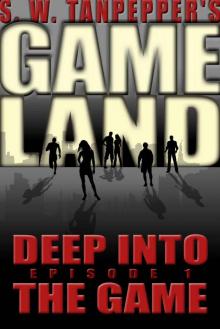 Deep Into the Game: S.W. Tanpepper's GAMELAND (Episode 1) (Volume 1) (S. W. Tanpepper's GAMELAND)
Deep Into the Game: S.W. Tanpepper's GAMELAND (Episode 1) (Volume 1) (S. W. Tanpepper's GAMELAND)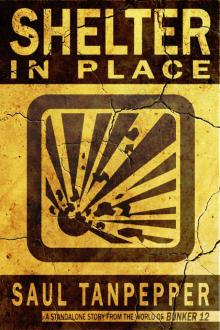 Shelter in Place: A short story from the world of BUNKER 12
Shelter in Place: A short story from the world of BUNKER 12 Iceland: An International Thriller (The Flense Book 2)
Iceland: An International Thriller (The Flense Book 2) GAMELAND Episodes 1-2: Deep Into the Game + Failsafe (S. W. Tanpepper's GAMELAND)
GAMELAND Episodes 1-2: Deep Into the Game + Failsafe (S. W. Tanpepper's GAMELAND) THE FLENSE: China: (Part 1 of THE FLENSE serial)
THE FLENSE: China: (Part 1 of THE FLENSE serial) S.W. Tanpepper's GAMELAND, Season One Omnibus
S.W. Tanpepper's GAMELAND, Season One Omnibus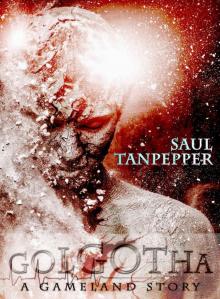 Golgotha: Prequel to S.W. Tanpepper's GAMELAND series (S. W. Tanpepper's GAMELAND companion title Book 1)
Golgotha: Prequel to S.W. Tanpepper's GAMELAND series (S. W. Tanpepper's GAMELAND companion title Book 1) THE FLENSE: China: (Part 3 of THE FLENSE serial)
THE FLENSE: China: (Part 3 of THE FLENSE serial)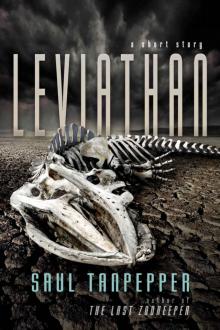 Leviathan: A Short Story About the End of the World
Leviathan: A Short Story About the End of the World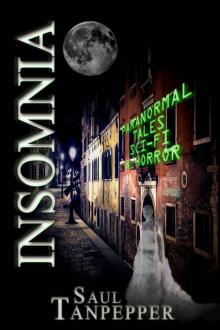 Insomnia: Paranormal Tales, Science Fiction, & Horror
Insomnia: Paranormal Tales, Science Fiction, & Horror Velveteen
Velveteen THE FLENSE: China: (Part 2 of THE FLENSE serial)
THE FLENSE: China: (Part 2 of THE FLENSE serial) Deadman's Switch & Sunder the Hollow Ones
Deadman's Switch & Sunder the Hollow Ones